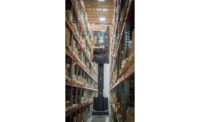Clemens Food Group Improves Warehouse Processes with Crown’s Fleet Management System

As with most warehouse and fleet managers today, Kevin Shayer, general manager of distribution and warehousing, Clemens Food Group continually faces  pressure to reduce costs and improve operator and forklift productivity. With 230 forklifts and 1,080 operators in three locations, it is a daunting task that requires high-priority objectives and a clear understanding of the condition of the fleet and how and when the forklifts are being operated.
pressure to reduce costs and improve operator and forklift productivity. With 230 forklifts and 1,080 operators in three locations, it is a daunting task that requires high-priority objectives and a clear understanding of the condition of the fleet and how and when the forklifts are being operated.
Based in Hatfield, Pa., this meat processor has been producing pork products for more than 118 years. The company’s three facilities include its main 1.3 million-square-foot processing plant and distribution center in Hatfield; a third-party logistics (CFC Logistics) warehouse in Quakertown, Pa.; and another processing plant in Emmaus, Pa. The bulk of the fleet (120 forklifts) is located at the main processing plant, with 50 forklifts at the 3PL facility and the remainder located at the second processing center.
“We knew the key factor to any continuous improvement process was information; specifically, convenient access to information that provides visibility into our operations and across three locations,” says Shayer. “We quickly realized we needed some sort of operator and fleet management system that would help us collect and analyze relevant fleet information that we could then use to identify opportunities to reduce costs and improve productivity.”
The Clemens team evaluated several fleet management systems, eventually deciding to deploy Crown Equipment’s InfoLink System. InfoLink, which is a part of the Crown Insite Productivity Suite, delivers actionable data from forklifts through content-rich dashboards that help fleet managers focus on real opportunities and avoid wasted time deciphering mounds of data.
“During the decision process, there were a few things we immediately liked about the Crown offering and moved it to the top of the list,” says Mike Bracrella, director of maintenance, Clemens Food Group. “We liked that the system was developed by an actual forklift provider and that it was easy to use. We also liked the broad range of information the system provided and the fact that it could be used with nearly any forklift from any manufacturer.”
Bracrella stressed how important it was that the system worked with all of their forklifts.
“While Crown forklifts make up the majority of our fleet, we do have other brands. It was critical that we deploy a system that could work with a mixed fleet without requiring any drastic changes on our end,” he adds.
The Clemens team worked closely with Brian Boyle, vice president of sales at Omnilift, Inc., an authorized dealer for Crown Equipment Corp., New Bremen, Ohio, to develop a plan and timeline for the InfoLink deployment. The Omnilift team included Leslie Constas, sales support manager, and Jason Rowland, lead technician, and helped Clemens decide on a phased approach that would begin August 2011 with the two satellite facilities and end a year later with installation completed in the main processing facility.
“The plan was that within a year, the InfoLink system would be connected on our entire fleet. Brian and his team were with us through the entire installation to help troubleshoot any issues or challenges we encountered,” says Jeff Barnes, maintenance engineer, Clemens Food Group. “We were pleasantly surprised that the installation was pretty painless. Within two months of installing the system into our satellite facilities, we were able to begin installing it in our main facility.”
Before the installation began, the Clemens team identified areas in their operation they initially wanted to target to uncover efficiency or cost-cutting opportunities and focus on areas of OSHA compliance, operator certification and impact detection. Only five months after the completion of the installation project, Barnes and his team realized significant improvements in all three of these areas.
“InfoLink brought a new level of efficiency to our OSHA compliance efforts,” says Barnes. “Because the system allows us to assign a PIN number to each operator, we are able to limit access to the vehicle to only those operators with the required certification needed to operate the forklift. Also, by integrating the inspection checklist into the system, we were able to automate the process and ensure the operator performs the inspection with the proper attention to detail.”
Through use of the system’s impact monitoring and management capabilities, the company also was able to dramatically decrease the number of impact events. Barnes and his team noticed an 80% reduction in major impact events. Because InfoLink collects and filters the number of impacts per shift, supervisors can track operator performance against defined impact benchmarks.
Clemens Food Group also began using the system to monitor and evaluate the productivity of the operators and the utilization of the fleet.
“Through the gathering of performance information and monitoring of benchmarks, we are able to identify our most productive operators, as well as identify the operators that may need additional training,” says Barnes. “We can even keep track of how and when our equipment is being used and which operator is on the equipment at any given time. Now, when someone at one of the facilities requests a new forklift, we are able to look at utilization rates for the forklifts in the facility to decide whether a new truck is really needed. Sometimes it’s just a matter of getting optimal use out of the trucks we currently have.”
“From a corporate standpoint, the InfoLink installation is viewed as a great success that continues to deliver a return on investment,” says Shayer. “We’ve only just started to really tap into the system’s ability to help us optimize fleet and operator performance. The system already has completely elevated and enhanced the safety culture of our facilities.”
Looking for a reprint of this article?
From high-res PDFs to custom plaques, order your copy today!





